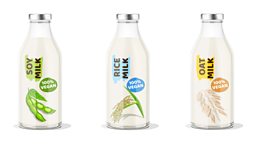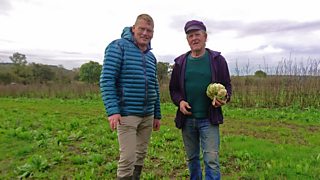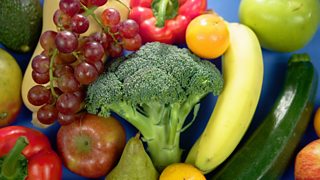Ultra-processed vegan and vegetarian foods: are they as healthy as they look?

Supermarket shelves are heaving with faux meats and vegan ultra-processed foods.
And if you don’t want to put cow’s milk in your cuppa, there are loads of alternatives derived from plants.
But are these ultra-processed vegan and vegetarian offerings as healthy as they look?
James Gallagher investigates for Radio 4's Inside Health.
What is an ultra-processed food?
“Most of the food we eat is processed,” says Dr Giles Yeo, an obesity expert at Cambridge University. Cooking is a process; fermentation is a process. “Ultra-processed foods however are a modern phenomenon in which they need to be industrially made, so these are processes which we cannot replicate in our kitchen.”
Ultra-processed foods tend to be low in protein and fibre, and high in salt, sugar and fat.Dr Giles Yeo
For example, it might be taking a chicken carcass, forcing it through a sieve to extract every last morsel of meat and tendon, and then reforming the resulting “white slime” into a chicken nugget. “It’s this industrial process of extrusion,” Giles explains.
What’s the problem with ultra-processed foods?
The problem with these types of foods, says Giles, is that they are stripped of protein and fibre. And because they’re so ultra-processed they lack flavour, so you have to create it by adding salt, sugar and fat. “So ultra-processed foods tend to be low in protein and fibre, and high in salt sugar and fat. That’s their problem.”
This also makes them “hyper-palatable.” Of the calories we eat today, in high income countries like the UK, 50 to 60 percent come from ultra-processed food.
So, what’s the impact on our health? “In countries which have more ultra-processed foods, there is an increase in obesity and other diet related illnesses,” says Giles.
Interestingly, when we think about ultra-processed foods, we tend to think about burgers and hotdogs. “But ultra-processed vegetarian or vegan foods, faux-meat burgers, they almost have an aura, a halo of health around them,” says the obesity expert. “They’re ultra-processed foods with very good PR.”

What is an ultra-processed food?
Dr Giles Yeo, obesity expert at Cambridge University, explains the nature and mechanics.
Why are these vegan and vegetarian foods ultra-processed?
“Ultimately, meat and fish are never going to be a processed food, because they are a single ingredient food,” explains Sophie Medlin, Dietician and Chair of the British Dietetic Association for London.
“When we get into trying to replicate them from plant products, we are definitely going to have to process them in order for them to look and feel and taste in any way palatable… The more you’re trying to make something imitate something that it’s not, the more processing it’s going to have to go through.”
Beware protein substitutes that contain little to no protein
“A lot of the higher tech faux meat burgers tend to be made with mung bean protein or peas and those will have protein,” says Giles. They may be more processed than the basic Quorn products (which are mainly made from fungus) or things like tofu, but some protein is present.
However, other ingredients used to imitate meat tell a different story. Jackfruit is sold as a vegan substitute for pulled pork, for instance. The issue here is that “jackfruit contains nearly no protein whatsoever,” states Giles. So, if you choose vegan pulled pork for your main and don’t replace the protein elsewhere, you end up having a meal with very little protein.
Are plant-based milks ultra-processed?

On most supermarket shelves you’ll now find soya milk, coconut milk, almond and oat milk – and that’s just scratching the surface. Are these faux milks ultra-processed? Should we be thinking twice about drinking them?
When switching to a plant-based milk, make sure it’s fortified with the right vitamins and minerals.Sophie Medlin, Dietician
“Some are certainly better than others, and some have gone through more processing in order to get them there,” says Sophie. Soya milk is a side product from making tofu and it’s high in protein. Coconut milk is just squeezed out of coconuts. Almonds do contain fat and some level of protein. “It is when you start to get to the oat and the quinoa milks that we get into some real ultra-processing,” says the dietician. They’re soaked in order to extract the white colour, fat is added (normally in the form of rapeseed oil) because neither contain fat naturally, iron and minerals are added, and the entire thing is emulsified.
Always buy fortified
Professor Susan Lanham-New, Head of Nutrition Sciences at Surrey University, has been investigating how good these milks are for us. She says the most important thing, when switching to a plant-based milk, is to make sure it’s fortified with the right vitamins and minerals.
The first is calcium. “We know that cow’s milk is naturally very high in calcium and we know in the United Kingdom about 50 to 60 percent of our calcium comes from milk and milk products,” says Susan. Particularly for young people and children whose skeletons are growing, calcium is crucial.
Another is Vitamin D, which we need to absorb calcium and to ensure we don’t get deficient in the winter when there aren’t the same levels of UV light. “Cow’s milk doesn’t contain a great deal of vitamin D but some plant milk manufacturers have started to add vitamin D in there so, for some products, you’ll actually be getting more vitamin D than you would in your cow’s milk,” she says.
And finally, iodine, which is in some plant milks and not in others, but we know is found in appreciable amounts in cow’s milk. “Iodine is particularly important for pregnant and lactating mothers,” says the nutritionist.
So, should we be eating ultra-processed vegan and vegetarian foods – or steering clear?

“When you have plant-based or vegan foods, what you are having less of, undoubtedly, is saturated fats,” says Giles. These fats tend to come from animal-based products so by eating any plant-based foods, ultra-processed or not, you will be consuming less. “From that perspective, it is going to be healthier.”
But vegan ultra-processed foods are still lower in fibre and inherently higher in sugar, salt and fat – saturated and unsaturated. “So, from that perspective, ultra-processed vegan and plant-based foods are still ultra-processed foods.”
Crucially, it matters what you would have been eating instead
If you’re someone that was eating a lot of red meat – particularly in the form of processed foods like burgers – and have moved to eating these veggie versions, it’s going to be an improvement.
It’s very trendy for young people to have plant-based milks, and although these may not be healthier than cow’s milk, “it would be far better for them to be drinking that than fizzy, high-sugar drinks that are nutritionally nowhere near as good,” says Susan.
But if you were vegetarian or vegan and preparing all of your meals from scratch, and have upped your intake of these processed options, your health might suffer.
It’s great that these products are now available, and everyone should be able to benefit from the convenience without compromising their ethics, says Sophie, but “it’s become much easier to be a very unhealthy vegan.”

What should we have in the back of our minds when we’re doing our weekly shop?
Always check the packet
Make sure you look through the ingredients list so you know how much protein you’re getting. “If you’re vegan, you have to look at the back of the pack. You have to think about it,” says Giles.
Although, it can be confusing and those in the industry need to make it easier, he admits. “We need to have a better display of nutrition so that people can walk into a supermarket and make the choices they need to make, particularly on these foods that are faux meat.”
Easy rules of thumb
“If you fancy a chocolate bar or a lasagne or a frozen pizza, try and pick the ones with the highest amount of protein and fibre, and with lower amounts of sugar,” says Giles.
And if you don’t feel like you have time to look at the detailed nutritional information, then there are some easier rules of thumb.
“Anything that’s wholewheat or wholegrain is going to have more fibre,” says Giles. Taking the chocolate bar example, anything with nuts is going to be higher protein; anything with more dried fruit is going to be higher in fibre.
Sugar, unfortunately, is less straightforward. “You have to look at the back of the pack for sugar.”
-
![]()
Inside Health: Ultra-processed vegetarian and vegan foods
We take a look at how healthy these foods are and what you need to know when you’re doing the weekly shop.

More food for thought from the ����ý
-
![]()
Costing the Earth: Vegan World
What would the British countryside look like if we all adopted the vegan diet recommended by many environmental campaigners?
-
![]()
Beyond Belief: Veganism
For many vegans their diet is part of an entire ethical belief system. So can you eat your way to moral and spiritual purity?
-
![]()
What if the whole world went vegan?
What if the whole world went vegan? What impact would it have in terms of climate change and the environment?
-
![]()
The Food Programme
Investigating every aspect of the food we eat.





